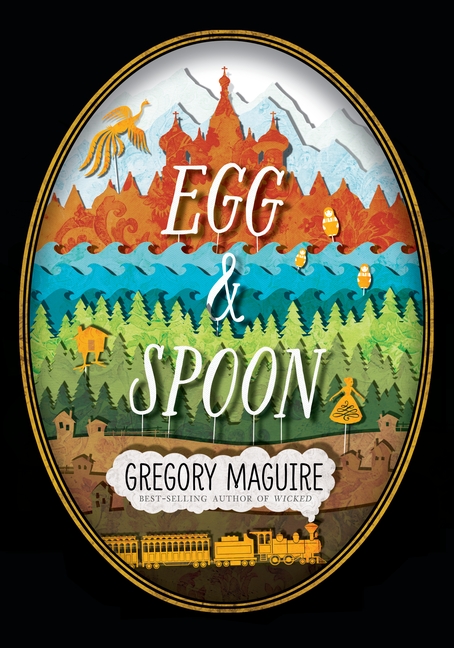Egg & Spoon
 Egg & Spoon, Gregory Maguire
Egg & Spoon, Gregory Maguire
Candlewick Press, September 2014
Reviewed from final copy
What an ingenious little (okay, big) book this is.
Maguire is at his best when he’s being sly and subverting tropes and expectations; he did it to genius effect in Wicked, which remains one of my favorite novels, and while his overall body of work is uneven, when his writing shines it’s positively lustrous.
This is him at his best.
Over at Heavy Medal, Nina already discussed some of what makes this a standout. The language is the obvious thing — it’s gorgeous. Sentence after sentence just flows perfectly. Wordplay, foreshadowing, the omniscient-but-not narrative voice (more on that below): I reveled in this. It’s a slow read — 475 pages, and on a nice heavy stock of paper to boot — but the kind of slow that can swallow a reader up and keep him or her enthralled the entire time. The plot is twisty and multi-leveled, with layers that can be read more deeply about childhood, poverty, governance of nations, the meaning of magic, and more, or all of that can be ignored for a long adventure that can still delight. There’s also an interesting play with some of the narrative quirks of great Russian fiction, although my own reading in that body of work isn’t very deep, so someone else might be able to comment on this more intelligently. What came across for me was some tonal callbacks in general, and the doctor in particular. And of course there’s the use of nested fairy tales, just like the nesting dolls, and the tales within tales — such strong imagery throughout, all of it so neatly tied together in ways that seem organic to the tale and the telling but reveal themselves in retrospect.
Now, I’ll admit that it flags a little in the end section — I love the adventures (the dolls and the soldiers — what a fantastic passage, in all senses), and there are some splendid little episodes woven together plus lots of Baba Yaga, a magnificent character. Her pathos and prickliness, her humor, the way she defies genre or textual limitations and ignores all the rules within her world and the reader’s world as well — yes. More like this, please. But the pacing is different from the earlier part of the novel, not always successfully, and the narrator has more to say and maybe goes a little saccharine at the end. I didn’t love that as a reader, but I don’t know that it’s not organic to the text and the story he’s been telling or the way he has sentimentalized his tale even as he claims he isn’t and we shouldn’t either.
There is, of course, the age debate, which has shades of an appeal debate too. I was shocked that it was being considered MG. In a way, I am even surprised that it could be considered YA: this was very strong in the adult appeal category. And I do believe I have readers for it among my HS students, but then, I have readers for adult and children’s books as well (Murakami and The Edge Chronicles both circulate…), so having readers doesn’t really settle the question. Here’s why I thought it wasn’t middle grade: it’s too long and it is improved by greater knowledge of the larger world. Also, narrator seemed like the opposite of what might be desired or expected for a children’s (or YA) title. However, that arch narrative voice shades back to Lemony Snicket or, as was pointed out in the comments on the Heavy Medal post, Adam Gidwitz, and has proven appeal for younger readers, so maybe I am just being unfair to them in thinking this is too much. Perhaps this is a true all ages (where all = fluent readers): Nina makes a case for child readers, I genuinely believe I can hand this off to a number of teens I work with, and the adult reviewers (4 stars) have proven adult appeal as well, at least for adults who read across the youth market. I think too that the reader will age the girls according to their own age; I assumed they were 14 or 15 (Cat, after all, is traveling to meet a potential husband), but a colleague who works with younger readers assumed 11 or 12. Which makes this fairly versatile — no readership pigeonholing thanks to character ages.
I’ve been thinking a lot about books I most want to talk to others about, and this is definitely one of those books. It’s strongly written, provocative, worth a second read, and a pleasure as well.
I’d say that means it deserves some recognition from someone.
![]()
RELATED
The job outlook in 2030: Librarians will be in demand
The job outlook in 2030: Librarians will be in demand
ALREADY A SUBSCRIBER? LOG IN
We are currently offering this content for free. Sign up now to activate your personal profile, where you can save articles for future viewing






Add Comment :-
Be the first reader to comment.
Comment Policy:
Comment should not be empty !!!